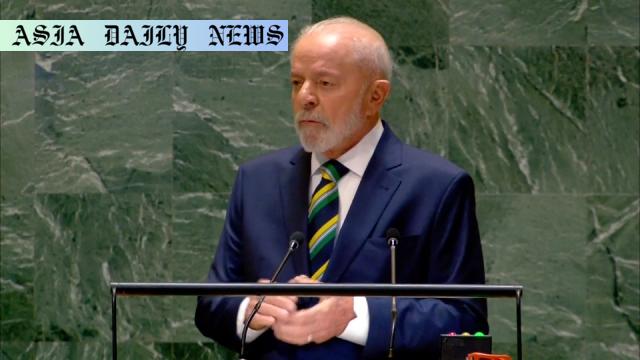Japan-Brazil relations: Japan invites Brazilian President Lula for a state visit; strategic talks to enhance global partnership.
Japan invites Brazilian President Lula as state guest after 6 years.
Strengthening global cooperation and economic ties emphasized.
State visit planned for March 24-27, featuring key meetings.

Historical Context of Japan-Brazil Relations
The announcement made by the Japanese government to host Brazilian President Luiz Inacio Lula da Silva as a state guest underscores a significant diplomatic milestone. The visit, scheduled for March 24-27, represents the first such invitation extended by Japan since 2019. This six-year hiatus owes itself largely to the disruptions caused by the global COVID-19 pandemic. The long-standing bond between Japan and Brazil, rooted in history and mutual cooperation, has steadily evolved over decades as both nations have emerged as strategic global partners.
Key Events During the Visit
President Lula’s upcoming visit is expected to be marked by a series of pivotal engagements. These include summit talks with Japanese Prime Minister Ishiba Shigeru, discussions with Emperor Naruhito and Empress Masako, and participation in a formal welcoming banquet at the Imperial Palace. Such events signal the reaffirmation and strengthening of Japan-Brazil ties, serving as a testament to the countries’ shared commitment to maintaining international harmony and advancing shared goals like sustainable economic growth.
Strategic Cooperation Between Japan and Brazil
As highlighted by Japan’s Chief Cabinet Secretary, Hayashi Yoshimasa, both nations are considered “strategic global partners.” This designation speaks to their multifaceted collaboration in spheres such as economic development, environmental sustainability, and technological innovation. The Japanese government intends to leverage this visit to cement its rapport with a key “Global South” nation, reaffirming mutual respect for the rule of law while seeking avenues for enhanced cooperation in trade, investment, and science and technology.
Economic Prospects of the Partnership
The scheduled visit also centers on bolstering economic ties between Japan and Brazil. Brazil, as the largest economy in South America, holds potential markets for Japanese innovation and investments. Key discussions are likely to revolve around shared interests such as climate change mitigation, renewable energy innovation, and technological advancements. For Japan, Brazil serves as a gateway to broader Latin American markets, representing an essential strategic partner in global trade.
Significance for Global Diplomacy
President Lula’s upcoming state visit is profoundly symbolic, not only for Japan-Brazil relations but also in the context of global diplomacy. By engaging with Brazil, Japan signals its acknowledgment of emerging economies’ roles in crafting a balanced international order. Moreover, the visit reflects Japan’s efforts to remain engaged with promising economies of the Global South, fostering alliances that respect sovereignty and shared vision while countering any unilateral narratives within global geopolitics.
Conclusion
The invitation extended to President Lula is far more than a symbolic gesture. It signifies a reinvigorated drive to expand partnerships, foster economic collaboration, and engage diplomatically with a pivotal ally. This state visit could mark the beginning of an era where the Japan-Brazil relationship plays an even more influential role on the world stage. As both nations align in their mutual interests and shared values, the outcomes of this historic meeting hold the promise of reshaping their bilateral narrative for years to come.
Commentary
The Importance of Diplomatic Re-Engagement
Japan’s decision to invite President Lula da Silva as a state guest marks a significant moment in bilateral relations. This move is not just about resuming diplomatic niceties after a pandemic-induced lull; it is a robust announcement of Japan’s intent to deepen its ties with Brazil, one of the key players in the Global South. By fostering such engagements, Japan demonstrates its commitment to maintaining diverse alliances in an increasingly volatile global landscape. It is an essential step toward promoting global cooperation and balance.
A Catalyst for Economic Opportunities
Beyond the politics, this visit opens up exciting possibilities for economic collaboration between the two countries. Brazil’s abundant natural resources combined with Japan’s technological prowess make this partnership potentially transformative. Whether it’s renewable energy, infrastructural investments, or advanced technology, the scope for economic synergy is enormous, and this visit could ignite long-term initiatives benefitting both nations.
Strength in Multilateralism
In a world that increasingly leans toward polarization, efforts like this state visit carry substantial weight. By fostering cooperation with Brazil, Japan not only strengthens its bilateral ties but also solidifies its commitment to multilateralism and the rule of law. Such efforts are commendable and necessary, providing a hopeful counterbalance to rising unilateralism and protectionist tendencies in the global arena.
Conclusion
In conclusion, President Lula’s visit to Japan represents a critical juncture for bilateral diplomacy. This state visit underlines the importance of collaboration and respect that must underpin international relations. It is a timely reminder of the value of alliances built on mutual respect, shared objectives, and a vision for global harmony and growth.


